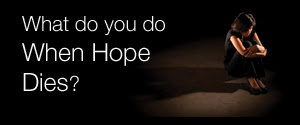Thursday's Therapy
The Road to Resilience
Part One
Introduction
How do people deal with difficult events that change their lives? The death of a loved one, loss of a job, serious illness, terrorist attacks and other traumatic events: these are all examples of very challenging life experiences. Many people react to such circumstances with a flood of strong emotions and a sense of uncertainty.Yet people generally adapt well over time to life-changing situations and stressful conditions. What enables them to do so? It involves resilience, an ongoing process that requires time and effort and engages people in taking a number of steps.
This brochure is intended to help readers with taking their own road to resilience. The information within describes resilience and some factors that affect how people deal with hardship. Much of the brochure focuses on developing and using a personal strategy for enhancing resilience.
What is resilience?
Resilience is the process of adapting well in the face of adversity, trauma, tragedy, threats, or even significant sources of stress -- such as family and relationship problems, serious health problems, or workplace and financial stressors. It means "bouncing back" from difficult experiences.Research has shown that resilience is ordinary, not extraordinary. People commonly demonstrate resilience. One example is the response of many Americans to the September 11, 2001 terrorist attacks and individuals' efforts to rebuild their lives.
Being resilient does not mean that a person doesn't experience difficulty or distress. Emotional pain and sadness are common in people who have suffered major adversity or trauma in their lives. In fact, the road to resilience is likely to involve considerable emotional distress.
Resilience is not a trait that people either have or do not have. It involves behaviors, thoughts, and actions that can be learned and developed in anyone.
Resilience factors & strategies
Factors in ResilienceSeveral additional factors are associated with resilience, including:
- The capacity to make realistic plans and take steps to carry them out
- A positive view of yourself and confidence in your strengths and abilities
- Skills in communication and problem solving
- The capacity to manage strong feelings and impulses
~The American Psychological Association
About this guide
Information contained in this brochure should not be used as a substitute for professional health and mental health care or consultation. Individuals who believe they may need or benefit from care should consult a psychologist or other licensed health/mental health professional.
Acknowledgments:
The American Psychological Association gratefully acknowledges the following contributors to this publication:
Lillian Comas-Diaz, Ph.D., Director, Transcultural Mental Health Institute, Washington, D.C.
Suniya S. Luthar, Ph.D., Teachers College, Columbia University, New York City, NY
Salvatore R. Maddi, Ph.D., The Hardiness Institute, Inc., University of California at Irvine, Newport Beach, CA
H. Katherine (Kit) O'Neill, Ph.D., North Dakota State University and Knowlton, O'Neill and Associates, Fargo, ND
Karen W. Saakvitne, Ph.D., Traumatic Stress Institute/Center for Adult & Adolescent Psychotherapy, South Windsor, CT
Richard Glenn Tedeschi, Ph.D., Department of Psychology, University of North Carolina at Charlotte
American Psychological Association
The American Psychological Association (APA), located in Washington, DC, is the largest scientific and professional organization representing psychology in the United States and is the world's largest association of psychologists. APA's membership includes more than 155,000 researchers, educators, clinicians, consultants and students. Through its 53 divisions and its affiliations with 60 state, territorial and Canadian provincial associations, APA works to advance psychology as a science and profession and as a means of promoting health and human welfare.
Discovery Health Channel
Discovery Health Channel takes viewers inside the fascinating and informative world of health and medicine to experience firsthand, compelling, real life stories of medical breakthroughs and human triumphs. From the people who bring you the Discovery Channel, the most trusted brand on television, Discovery Health Channel is part of a major, multi-media business designed to help consumers lead healthier, more vigorous lives. Discovery Health Channel and Discvoery.com/health were formed by Discovery Communications, Inc. (DCI), a privately held, diversified media company headquartered in Bethesda, MD.




























+3350064_794472695_n-1.jpg)








+90666955_931631647_n.jpeg)









+_958859577_n.jpeg)





